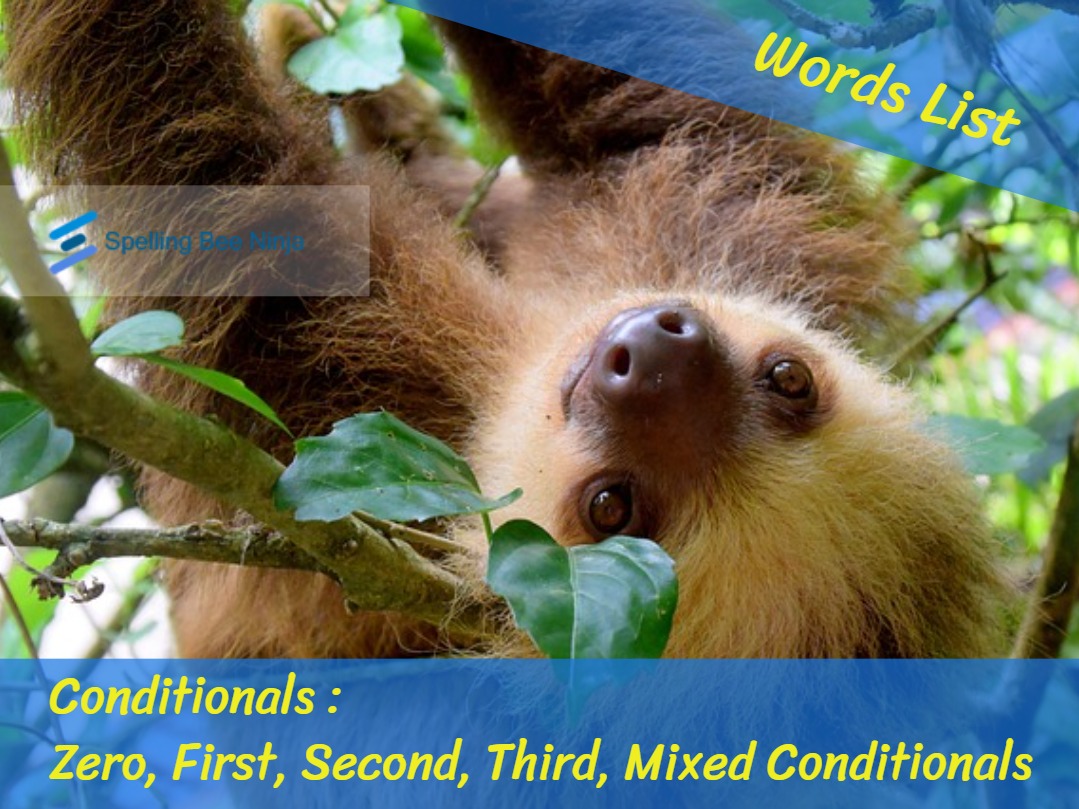English conditionals are structures used to talk about possibilities, results, and hypothetical situations. They help us express cause and effect and imagine different outcomes. There are five main types: zero, first, second, third, and mixed conditionals. Each one has a unique structure and use.
1. Zero Conditional – General Truths
Use:
We use the zero conditional to talk about facts, general truths, and things that are always true if something happens.
Structure:
If + present simple, present simple
| If-clause | Main clause |
|---|---|
| If + present simple | present simple |
Examples:
If you heat water to 100°C, it boils.
If people don’t drink water, they get dehydrated.
If you touch fire, it burns.
Insight:
Think of the zero conditional as a scientific or factual formula. There’s no guessing or imagining — just truth.
2. First Conditional – Real Future Possibilities
Use:
The first conditional is used for real and possible situations in the future. It expresses something that might happen if a certain condition is met.
Structure:
If + present simple, will + base verb
| If-clause | Main clause |
|---|---|
| If + present simple | will + base verb |
Examples:
If it rains, we will cancel the trip.
If I study, I will pass the test.
If she calls, I will answer.
Insight:
Use this when you’re predicting or making decisions based on likely events.
3. Second Conditional – Unreal / Hypothetical Present or Future
Use:
We use the second conditional for unreal or imaginary situations in the present or future. These things won’t likely happen, or they are not true now.
Structure:
If + past simple, would + base verb
| If-clause | Main clause |
|---|---|
| If + past simple | would + base verb |
Examples:
If I had more money, I would buy a house.
If he were taller, he would be a basketball player.
If they knew the answer, they would tell us.
Note: Use “were” instead of “was” for all subjects in formal writing: “If I were you…”
Insight:
Use this for dreams, hypotheticals, and polite advice.
4. Third Conditional – Imaginary Past
Use:
The third conditional talks about unreal situations in the past. It shows regret, blame, or what could have happened differently.
Structure:
If + past perfect, would have + past participle
| If-clause | Main clause |
|---|---|
| If + past perfect | would have + past participle |
Examples:
If she had studied, she would have passed the exam.
If we had left earlier, we wouldn’t have missed the bus.
If I had known, I would have helped.
Insight:
Use this when it’s too late to change the past, but you want to imagine a different outcome.
5. Mixed Conditionals – Past and Present Combined
Use:
Mixed conditionals combine different times in the “if” and “main” clauses. The most common types are:
A. Past → Present Result
Describes how a past action affects a present situation.
Structure:
If + past perfect, would + base verb
| If-clause | Main clause |
|---|---|
| If + past perfect | would + base verb |
Examples:
If I had gone to university, I would have a better job now.
If she had taken the medicine, she would feel better.
B. Present → Past Result
Less common. Describes how a present (unreal) situation would have changed the past.
Structure:
If + past simple, would have + past participle
| If-clause | Main clause |
|---|---|
| If + past simple | would have + past participle |
Examples:
If he were more careful, he wouldn’t have crashed the car.
If I were smarter, I would have solved the problem earlier.
Summary Table of All Conditionals
| Type | Time | Situation | Structure | Example |
|---|---|---|---|---|
| Zero | Anytime | Facts | If + present, present | If you mix red and blue, you get purple. |
| First | Future | Real possibility | If + present, will + verb | If it rains, I will stay home. |
| Second | Present/Future | Unreal/hypothetical | If + past, would + verb | If I were rich, I would travel. |
| Third | Past | Unreal past | If + past perfect, would have + past participle | If I had studied, I would have passed. |
| Mixed | Past → Present or Present → Past | Unreal connection | Mixed patterns | If she had studied, she would be confident now. |
Common ESL Mistakes
Wrong tense usage:
–WRONG– If I will see him, I will tell him.
–RIGHT– If I see him, I will tell him.
Using “was” instead of “were”:
–WRONG– If I was you…
–RIGHT– If I were you…
Mixing structures:
–WRONG– If I studied, I would have passed.
–RIGHT– If I had studied, I would have passed. (Third)
–RIGHT– If I studied, I would pass. (Second)
Practice Tips
Make your own examples using each conditional.
Visualize the timeline: When does the action happen?
Use songs and movies – Many use conditionals naturally.
Try changing one sentence into all four types to feel the difference.
Example Transformation (Using: “win the lottery”)
| Conditional Type | Example |
|---|---|
| Zero | If people win the lottery, they usually buy cars. |
| First | If I win the lottery, I will travel the world. |
| Second | If I won the lottery, I would travel the world. |
| Third | If I had won the lottery, I would have traveled the world. |
| Mixed | If I had won the lottery, I would be rich now. |
Exercise, identify all the conditional sentences
Instructions for the Student:
Read the paragraph and identify all the conditional sentences. Then, write which type of conditional each one is: Zero, First, Second, Third, or Mixed.
Paragraph for Analysis:
Last week, I missed the bus. If I had woken up earlier, I wouldn’t have been late for school. My teacher was upset and said, “If you’re late again, you will have detention.” I was so tired because I hadn’t gone to bed early. If I were more responsible, I wouldn’t miss the bus so often. If I miss the bus tomorrow, I’ll call my mom for a ride. But honestly, if people sleep late every night, they usually feel tired in the morning.
Answer Table:
| Sentence | Type of Conditional |
|---|---|
| If I had woken up earlier, I wouldn’t have been late for school. | Third Conditional |
| If you’re late again, you will have detention. | First Conditional |
| If I were more responsible, I wouldn’t miss the bus so often. | Second Conditional |
| If I miss the bus tomorrow, I’ll call my mom for a ride. | First Conditional |
| If people sleep late every night, they usually feel tired in the morning. | Zero Conditional |
Now that you learned all the concepts of Conditionals you are ready to take the verification test below:
Final Thoughts
Mastering conditionals helps you express possibilities, regrets, advice, and logical conclusions. Whether you’re writing an essay, chatting with friends, or giving a presentation — conditionals give your English power and precision.
Would you like this as a printable worksheet or with interactive exercises?
- ✈️ How to Use Articles in English
- 🐝 Mastering Adjectives: A Key to Enhancing Your Writing Skills
- 🎮 Pronoun Puzzle: A Fun Way to Practice Personal and Possessive Forms
- 🎮 Adjective Adventure: Descriptive Word Search!
- ✈️ How to use prepositions in English
- ✈️ English Adverbs – 5 Quick and Easy ways to learn.
- The definitive pronouns list
- 🐝 Understanding conjunction words and where to use them
- ✈️ Modal Verbs in English: A Comprehensive Guide
- 🐝 Prepositions list – The definitive guide
- ✈️ Active and Passive Voice
- ✈️ What vs Which: differences and examples
- 🐝 Complete transition words list
- ✈️ How to Use Punctuation in English
- ✈️ Exploring the Difference Between “Will” and “Shall” in English
- ✈️ The Difference Between Could, Should, and Ought in English
- ✈️ Common Idiomatic Expressions in English
- ✈️ 40 English Prefixes and their meanings
- ✈️ 30 Most common English suffixes and their meaning.
- 🐝 Linking Words In English And How To Learn Them Effectively
- ✈️ Comparative and Superlative Adjectives
- ✈️ The Six Noun Types (Common, Proper, Countable, Uncountable, Collective, Abstract)
- ✈️ Understanding English Clauses: A Complete Guide
- ✈️ Understanding Sentence Structure in English
- ✈️ Gerunds and Infinitives: Understanding Verb Complements in English
- ✈️ Common Pronunciation Mistakes and How to Fix Them
- ✈️ Question Formation in English
- ✈️ Common Sentence Errors: Fragments, Run-ons, and Misplaced Modifiers
- ✈️ Say What?! A Fun Guide to Direct and Indirect Speech
- ✈️ Commonly Confused Words
- 🐝 ELA vocabulary: Essential English Language Arts Terms Every Student Should Know
- ✈️ Formal vs. Informal Language
- ✈️ Mastering Phrases in English Grammar
- ✈️ Conditionals (Zero, First, Second, Third, Mixed Conditionals)
- ✈️ Emphasis and Inversion in Sentences
- ✈️ Understanding and Using the Imperative Form


